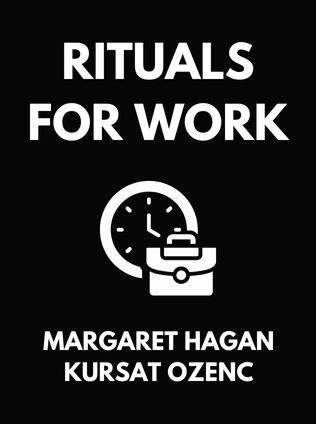
Rituals for Work
50 Ways to Create Engagement, Shared Purpose, and a Culture that Can Adapt to Change
By Margaret Hagan, Kursat Ozenc
Published 04/2019
About the Authors
Kursat Ozenc, Ph.D. is a Senior User Experience Designer at SAP Labs Palo Alto and teaches interaction and service design at Stanford's Institute of Design (the d.school). He also leads workshops on rituals for personal and group relationships, organizational change, and civic design.
Margaret Hagan, Ph.D., J.D. is the director of the Legal Design Lab at Stanford University, where she teaches classes at the d.school. A thought leader in the legal industry, she pioneers a human-centered approach to how legal and government groups serve people.
Main Idea
Rituals for Work delves into the transformative power of rituals within the workplace. It highlights how creative rituals can make our personal and business lives more meaningful and rewarding. Rituals reinforce good habits, motivate personal and professional achievement, create a common bond between co-workers, and build shared values. They can transform an organization’s culture and provide a foundation to achieve common goals. The book goes beyond simple analysis to provide actual recipes for individual rituals designed to promote specific habits, change negative behaviors, and instill values. Each ritual can be adapted to achieve a multitude of goals and tailored to fit your organization or team’s specific needs.
Table of Contents
- The Power of Rituals
- Rituals for Better Work
- Why Bring Rituals Into Work?
- Rituals for Work
- Creativity and Innovation Rituals
- Performance and Flow Rituals
- Conflict and Resilience Rituals
- Community and Team Building Rituals
- Organizational Change and Transition Rituals
- Designing Rituals With and For Teams
- Discovery Phase
- Design Phase
- Deployment Phase
The Power of Rituals
Rituals for Better Work
Rituals give order and meaning to our lives. Foundational studies of rituals emerged from the work of sociologist Emile Durkheim, who discovered that rituals are a central backbone to how belief systems operate. Rituals make beliefs concrete and graspable for people. They provide structure, bringing a sense of control and meaning.
Rituals also offer a safe space to experiment. Anthropologist Clifford Geertz found that when people act out rituals, they can escape the "real" world and imagine other ways of behaving and living. This safe, structured zone allows for the development of better ways of living.
A recent review of scholarship on rituals found that the physical actions of rituals help people feel satisfied. Ritual actions regulate emotions, keep people calm, and improve performance by fostering a steadier and more focused approach. They also enhance a sense of belonging, providing stable social connections.
"Rituals are actions that a person or group does repeatedly, following a similar pattern or script, in which they’ve imbued symbolism and meaning." - Kursat Ozenc & Margaret Hagan
Why Bring Rituals Into Work?
Work environments today face significant challenges, including low employee engagement, high stress levels, inhuman environments, and failed reorganizations. Rituals can be a powerful strategy to improve work life, helping us act more like we aspire to be. They bond people together, help navigate conflicts, enhance performance, and assist in adapting to change.
Rituals involve physical movement and a patterned rhythm that activates a sense of something special. Symbols, such as props, words, or actions, represent higher values and transform the average into the special. A good ritual tells a story, helping people make sense of situations and understand their bigger picture implications.
Sign up for FREE and get access to 1,400+ books summaries.
You May Also Like
The Subtle Art of Not Giving a F*ck
A Counterintuitive Approach to Living a Good Life
By Mark MansonRich Dad Poor Dad
What the Rich Teach Their Kids About Money - That the Poor and Middle Class Do Not!
By Robert T. KiyosakiHow To Win Friends and Influence People
The All-Time Classic Manual Of People Skills
By Dale CarnegieQuiet: The Power of Introverts
The Power of Introverts in a World That Can't Stop Talking
By Susan Cain



















